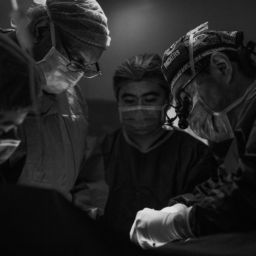British medics are obsessed with London; it is viewed as the epitome of medical training, the place to become a truly great doctor and work at the forefront of medicine and science. Medicine is certainly not unique in this regard; many sectors focus on the capital city as the place to be if you want to get ahead in your career, but having now worked in London for three years I have had time to reflect on the god-like status that NHS trusts in London are given and whether they live up to their expectations.
We as doctors are fortunate to be able to work anywhere in the country (a bit too fortunate when you consider the amount of times you have to move throughout your medical training). Yet the obsession with London persists. London is consistently one of the most competitive locations for almost all specialities, with the recurring stereotype and nightmare stories of medics training outside of London being in some ways worse due to the ‘inferior’ training that they receive or the lack of opportunities on offer outside of the capital.
The following are my own observations as a junior doctor of what makes London different:
Academia.
Many junior doctors move to London because of the research opportunities and I have to admit the opportunities are certainly there – for certain types of research. Whilst working in London I have received regular emails from clinicians, researchers, universities and trusts offering ready-made Masters and PhDs that I have not been offered whilst working elsewhere. These research opportunities are often aimed at the same general topics – neuroscience, pharmacology and genetics – but there are also opportunities within the humanities such as law and ethics that can be integrated into clinical practice. Indeed, some of the more well-known centres of medical research are in London, with the assumption that most funding and thus research opportunities for junior doctors would be concentrated in these areas. Long-distance research has however started to become more popular (at least for desk-based research where it is possible) with the pandemic, with more research opportunities now being available across the country rather than being tied to a specific location where you have to go in everyday. Despite this, depending on the type of research you want to do, most junior doctors with an interest in research will still look to London as the place to be (at least initially), and I will admit that the opportunities I have received here have been far, far greater than outside of the city.
There is however another side to this research-oriented focus; its impact on clinical care, especially as a junior doctor. It is very common, in my limited experience, to be working alone within a clinical environment as a junior doctor with your consultant and registrar to be consistently absent, either too busy working on papers, presenting research or teaching, thereby leaving you alone to deal with clinical issues that may well be beyond your competencies (this sadly is not a unique situation). Of course if you are interested in getting involved in this research then having a consultant who is
also an academic can be great – but there can be a pay-off to your clinical practice as I have observed, and this can impact not just your own development as a junior doctor but also patient care, with patients needs and treatment plans taking on a very different perspective.
There can sometimes be an overwhelming focus on the latest scientific research (particularly if your consultant is the lead of such research), embedded within neuro-imaging, pharmacology or genetics, which may have very little to do with your actual patient but is applied to patient care in a way that it can sometimes take away from tailoring the treatment to the patients needs, with too much hype being placed on the implementing ‘new’ research.
Supra-supra-specialised.
The other supposed draw of London is its reputation as being at the forefront of healthcare, characterised by world-leading clinicians working in super-specialised specialities in quaternary hospitals.
This, in my limited experience, can sometimes lead to people being bounced around different specialities with an obsession of finding a rare disease, rather than accepting that common things are common and that sometimes we just don’t know the answer. It was particularly enlightening for me to see how patients who, if I had treated elsewhere in the UK, would continue to be seen by primary or secondary care with the acknowledgement that we don’t quite know what’s wrong but we will try to treat the symptoms as best we can, but being treated in London were suddenly being over-investigated with fancy and intrusive machinery, which in the end very rarely revealed anything anyway. Yet there continued to be this obsession with finding the right diagnosis and referring to different super-specialities for each specific symptom that the patient had rather than tying things together, appreciating the bigger picture and indeed appreciating the ambiguity of medicine. Sometimes a tummy bug really is a tummy bug.
The private sector.
Prior to working in London I had very little experience with the private healthcare sector. Here, it seems to be common for individuals to seek assistance from private clinicians and I have been surprised at the varied results it can bring. From dubious diagnoses to patients being treated like customers and getting what they want ‘because customer knows best’ to the medicalisation of general aches and pains so that people can receive an ‘answer’ for their troubles – especially if they have paid for it! Working in London has made me see healthcare in a very different light – as a commodity rather than a need, a pill for every ill and a place where the patient gets what they want, when they want it, even if there is no medical reason for it.
Acuity.
Finally, working as a junior doctor in London has a reputation for being busy; you are constantly seeing a high level of patients each day every day in a way that you may not be elsewhere (although I would question this assumption). But there is certainly a high level of acuity from a very diverse population and with this comes a diverse range of illness that you may not be exposed to elsewhere. I have come across diseases that I had only read about in medical school before and worked with clinicians who run clinics for super-rare illnesses on a regular basis, resulting in them becoming experts in their niche fields. Thus, it can certainly become a unique learning experience, but it does also mean you lose out on other aspects of clinical care: building a therapeutic relationship with your patients, getting to know your patients and their families and understanding how a disease affects their life. In other words, you lose out on good clinical care.
So, is London the be-all in medical training, the place to be if you want to be the best? It depends. In the last three years I have witnessed patients turned into consumers, everyday life becoming medicalised in response to people’s immediate expectations, a fragmentation of services where super-super specialists refuse to talk with each other (or even with their patients) and an obsession with the niche and rare at the expense of the ‘boring’ and everyday.














